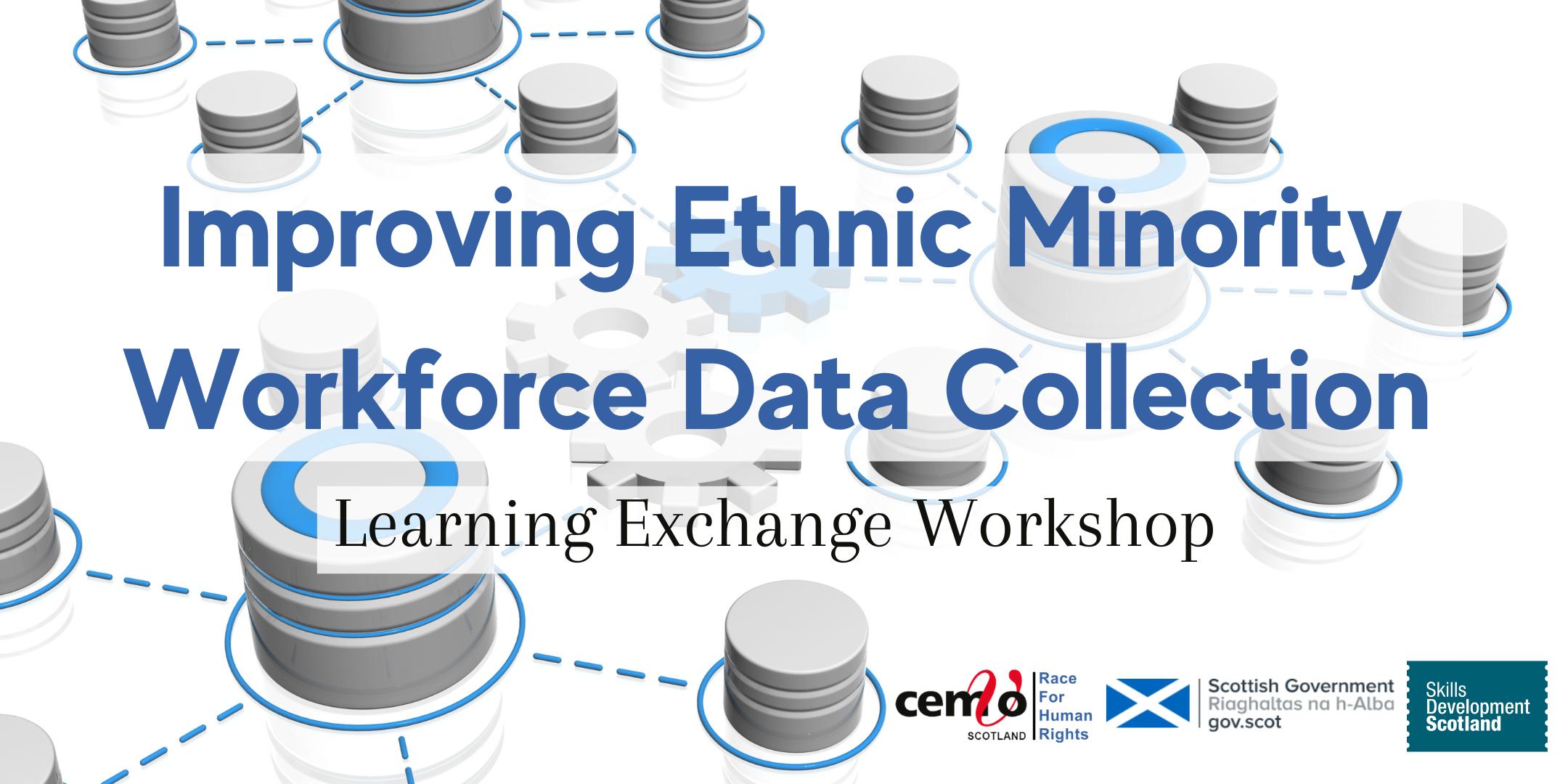
About Us
CEMVO Scotland is a national intermediary organisation and a long-standing strategic partner to the Scottish Government’s Directorate for Equality, Inclusion and Human Rights. We aim to build the capacity of the ethnic minority voluntary sector and its communities. We have an established network of ethnic minority (EM) and public and third sector organisations throughout Scotland to which we deliver a wide range of capacity-building support programmes. Our current programmes of work include:
- Providing social enterprise development support to EM groups and social entrepreneurs
- Providing race equality and human rights mainstreaming support to Public, Statutory and Third Sector organisations
- Increasing EM representation on Public Boards
- Supporting the Scottish Minority Ethnic Women’s Network (SMEWN) for peer support and influencing social policy
- Developing and supporting an EM Environmental Network to engage in climate change policy
- Providing employability support to EM young people
Through all our areas of work we continually engage extensively with the EM sector and gather evidence on the needs and concerns affecting EM communities which help to inform our response to the development of national and local policies and public consultations.
The Race for Human Rights programme (R4HR) funded through the Scottish Government’s Directorate for Equality, Inclusion and Human Rights and administered by Inspiring Scotland is designed to help public services increasingly embed equality and human rights in their strategic planning and day-to-day functions. We provide a platform to utilise the experience of people with protected characteristics to inform the policy and practice of public bodies. Sequentially, the programme supports diverse individuals and communities to increase their participation in public life.
For organisations looking to better understand how to integrate equality and human rights into their work, we offer the following services:
- Consultancy support for mainstream organisations
- Mediate engagement with EM communities
- Training and webinars
- Learning workshops
Introduction
Data allows organisations to inform policies and monitor progress. The Scottish Government’s Race Equality Framework 2016-2030 (REF) previously identified of the significant lack of ethnicity data which hinders the development of evidence-based policies and sustainable goals such as the representation of ethnic minority staff in the public sector (REF, p. 46). The core work of CEMVO Scotland has focused on mainstreaming support, with a consistent theme on the difficulty in the collection of ethnicity data, particularly after the General Data Protection Regulation (GDPR) came into force. Although it is a legal requirement for those organisations subject to Scottish Specific Equality Duties (SSED) and the Public Sector Equality Duty (PSED) to collect ethnicity data, there is no legal requirement for employees to disclose this information. Therefore, to assist organisations in improving their ethnicity data disclosure rates, , CEMVO Scotland delivered a unique learning opportunity for the public sector, in partnership with the Scottish Government’s Fair and Inclusive Workplaces Unit and Skills Development Scotland (SDS).
The session aimed to provide a safe space for learning exchange to help improve ethnic minority (EM) workforce data collection and to empower senior public sector leaders with increased knowledge and understanding of an anti-racist approach using human rights as a tool to improve their data collection methods. Further, it provided a means to inform the development of the Scottish Government’s ethnicity pay gap strategy, which will published in autumn this year. The strategy will support and encourage employers to address racial inequality in their organisation, improve data practices and practices to increase the recruitment, retention and progression of minority ethnic people.
This workshop also forms part of the continuing work in the Scottish Government to support and encourage public sector leaders to take forward actions in the Joint Commitment – a pledge between Scottish Government and public sector leaders to take forward a series of actions to address race equality in their organisations, including those stemming from recommendations in the report from the Scottish Parliament’s Equalities and Human Rights Committee inquiry on race equality, employment and skills. We invited senior leaders across the public sector, many of whom we have engaged with as part of the Joint Commitment work, including those who participated in the Scottish Government’s Public Sector Leadership Summit in March 2021, and the National Conference on Race Equality in Employment in December last year.
This workshop was informed by the learning and feedback from these events, including the need for more practical, solutions-focussed sessions and platforms for sharing learning and practices.
Our programme objectives included:
- Develop good approaches to data gathering
- Exchange ideas and share practices
- Learn from a case study that has led to increased ethnicity data disclosure rates
- Discuss some of the common challenges Public Bodies have come across with regards to ethnicity data collection
The programme was made up of four elements: input from the Scottish Government on its race employment policy agenda , common themes emerging from CEMVO Scotland’s R4HR consultancy programme, with a human rights approach illustrated as an aid to overcoming barriers; a case study example from Skills Development Scotland; and a breakout room session to discuss data collection practice.
We asked participants to come prepared with some information as this was an active learning opportunity with a guided practical session. An evaluation of the workshop was conducted before ending where we measured how much organisations better understood how to integrate equality and human rights into their work and how public services can increasingly embed equality and human rights in their strategic planning and day–to-day functions.
What Learning took Place?/Event Programme
Scottish Government Input
The workshop opened with the Scottish Government’s Director for Fair Work Employability and Skills, and Fair Work Champion, Helena Gray, who spoke on addressing racial inequalities and the role of leadership in driving this agenda. There was a reiteration of the Joint Commitment, specifically the action around ethnicity data collection and analysis; for public authorities to address race equality in their organisations; review data collection and analysis which related to the purpose of this workshop. . The affirmation to “shift the dial from good intentions to actions and outcome” is why we need data to inform race equality policies and practices and monitor progress. Ms Gray also provided an update on the Fair Work policy agenda and the Ethnicity Pay Gap (EPG) strategy and again, reflected on the importance of leadership and obligations in workforce data collections.
CEMVO Scotland Input
With nearly 20 years of experience in the race equality sector, CEO of CEMVO Scotland, Colin Lee, highlighted the work of CEMVO’s R4HR consultancy programme. He covered the importance of collecting ethnicity data in the workforce, in particular how this data should be used to identify the barriers EM staff within organisations are facing and how data provides the information and the legal basis of positive action measures.
A key consideration is that data disclosure is voluntary. Whilst public authorities subject to the PSED have a requirement to collect data, minority ethnic employees can choose whether or not to disclose. This therefore makes it essential for employers to build trust among employees, and create an inclusive organisational culture where the workforce is comfortable disclosing and is assured in how their data would be used.
Using a human rights-based approach
To support organisations with this, our Human Rights Officer, Clare Gallagher, briefly explained the PANEL principal approach. These are underlying principles to support the application of a human rights-based approach in practice and includes: participation; accountability; non-discrimination and equality; empowerment; and legality. These principles are to be used as a guidance tool in data collection policies and procedures to ensure quality policy development, service provision and decision making. It allows for the public authority to be transparent, accessible, and empowering and ensures their collection of data complies with legislation including GDPR, Equality Act 2010 and human rights law. This approach makes clear that asking for personal information is pursuant of a legitimate aim and supports the spirit of human rights law, dignity. The PANEL principles are a means to implement a sustainable rights-respecting culture within your organisation.
Case Study – Skills Development Scotland
To further enhance the productivity of this learning workshop, a presentation was delivered by Skills Development Scotland (SDS) on how they improved their diversity monitoring for their workforce, including ethnicity data. Through the sharing of good practice, SDS were able to illustrate how they identified improvements through communications and their approach, which led to an increase in the rate of data disclosure. . In line with their to collect, analyse and report data, SDS were able to successfully increase their equalities data which has further progressed their organisational goal to become inclusive employers through establishing an evidence base on which to inform policies and procedures.
Breakout Session
The breakout sessions were designed to be a safe space for people to have an open and reflective discussion on their organisations’ data gathering practices with the aim of learning from others to improve the policies and systems they already have in place.
We asked attendees to come prepared with some information on their organisations’ workforce data collection methods/policies that are relevant to this workshop. Practical points were fed back to the main workshop session to continue the theme of sharing learning.
The following themes arose in discussion:
One organisation mentioned they had a similar approach to SDS’ data collection, though flagged that when moving to a new HR system they were not able to transfer existing data across, leaving no equalities data in the system and requiring the recollection of this data. Methods they referenced to re-build their equalities data included:
Automated emails and messages to encourage staff to update their equalities information. This had some initial pushback from staff to reduce the number of reminders, which resulted in the organisation deciding to only use reminders when staff log on.
Undertaking work to encourage staff who ‘prefer not to say’ to disclose. This included work to identify how to build trust and a safe, diverse and inclusive workplace.
One local authority mentioned that all local authorities now use census categories to collect data and this has led to greater consistency and comparability across councils. Their next step would be to increase data disclosure for frontline staff who do not have a work email address. Work had begun to improve this, including allowing these staff members to use their personal email address to access the online employee portal and enabling staff to use council service hubs, designed for members of the public, to log on to provide their data.
Other organisations emphasised the role of minority ethnic staff networks to help promote data disclosure campaigns and some had organised focus groups with staff networks as a way of helping inform their approach to building a safe, diverse and inclusive workforce that enables staff to feel comfortable disclosing their ethnicity information.
Other organisations mentioned the benefits of systems such as TalentLink which allows data to be collected at recruitment stage and pulled through when applicants become appointed , therefore streamlining procedure for retaining diversity information.
Some organisations noted the impact of small datasets on public authorities ability to report their ethnicity pay gap.
Participant Evaluation and Results
The outcomes of this workshop have been anticipated as we designed this programme reflecting on participant feedback from the Scottish Government’s National Conference in December 2021, where a solution-focused, practical learning opportunity was requested. Out of 28 people who registered for the event, 21 attended (75%).
Questions and answers:
- Are you a senior leader/decision-maker?
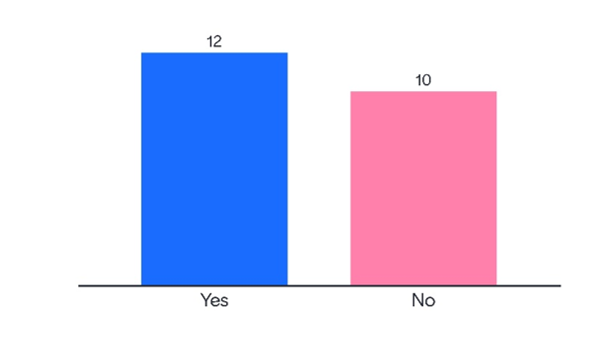
- What specific support do you need to implement learning from todays session to improve data collection?Attendees provided a range of different responses as to what specific support they felt they needed to implement learning from the workshop. There was a high percentage of respondents requesting help to reinforce actions to implement the learning from the workshop. Others noted they would benefit from establishing and maintain platforms to share sharing information and practices internally and across organisations, and many had request a copy of the slides from SDS case study and workshop presentations to inform their thinking. Attendees also noted the need for better resources such as an effective IT system to capture the information and adequate time allocated to complete the activities. Some noted that they would benefit from support from their senior leaders. Attendees further mentioned they would need benefit from help in disaggregating data to produce an effective analysis alongside addressing specific challenges. Support in the form of continued opportunities for networking and templates with illustrations were also requested.
- What learning have you taken away from today’s workshop?The sharing of good practice was frequently mentioned in the feedback and was considered the most valuable element of the event. Going further, many participants also suggested that the sharing of physical materials assists in a consistent approach tousing effective language and demonstrating how activities take shape. The workshop covered a complex issue, which reaffirmed the need to allocate more time to these issues and also highlighted the importance of networking.
- Please rate the following statements, from 1-3, as a result of this workshop:
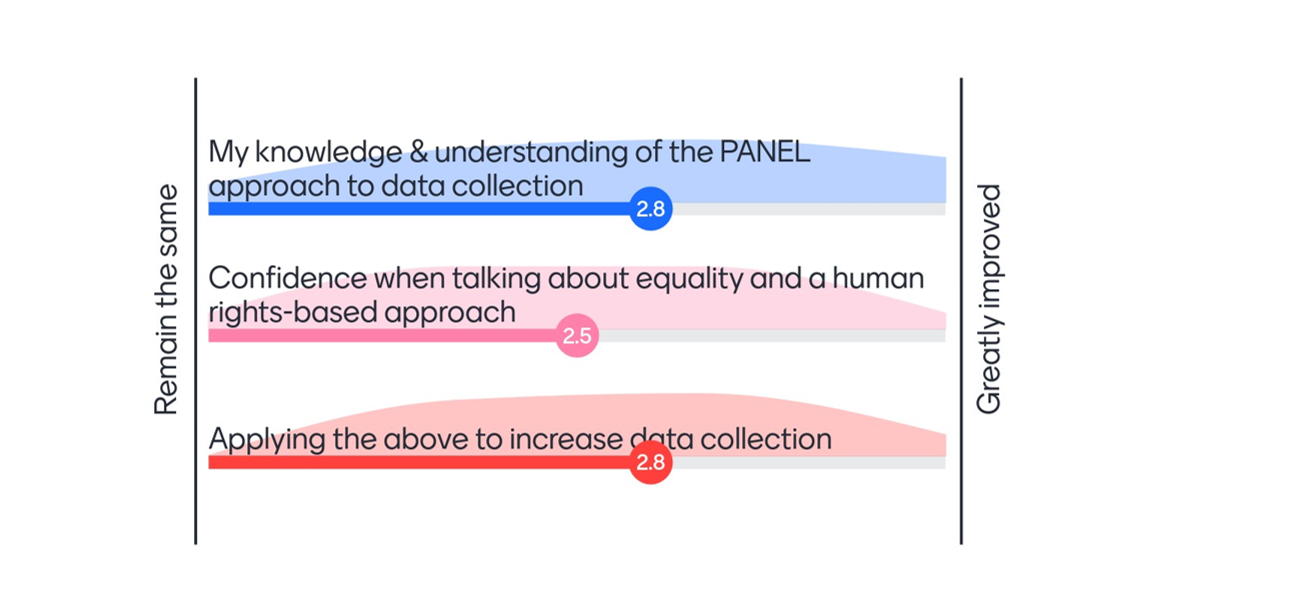
- What would you like to see included in the Scottish Government’s Ethnicity Pay Gap strategy to support employers to address racial inequality?
Participants outline the following:- Guidance on collecting quality and accurate data for intersectional analysis and
- How to address the issue of low disclosure rates
- Calculation formula for ethnicity pay gap reporting.
Further good practice examples and training for smaller organisations.
- What other areas would you like to have future active learning workshops on?
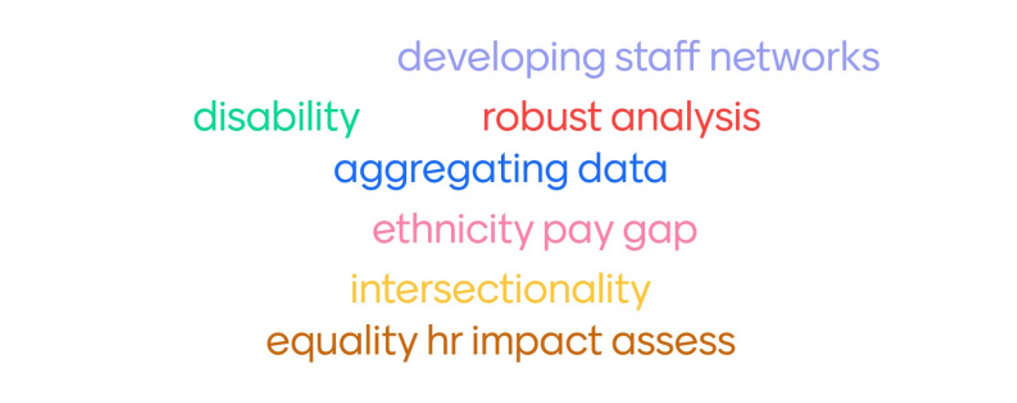
- What did you like about today’s workshop?
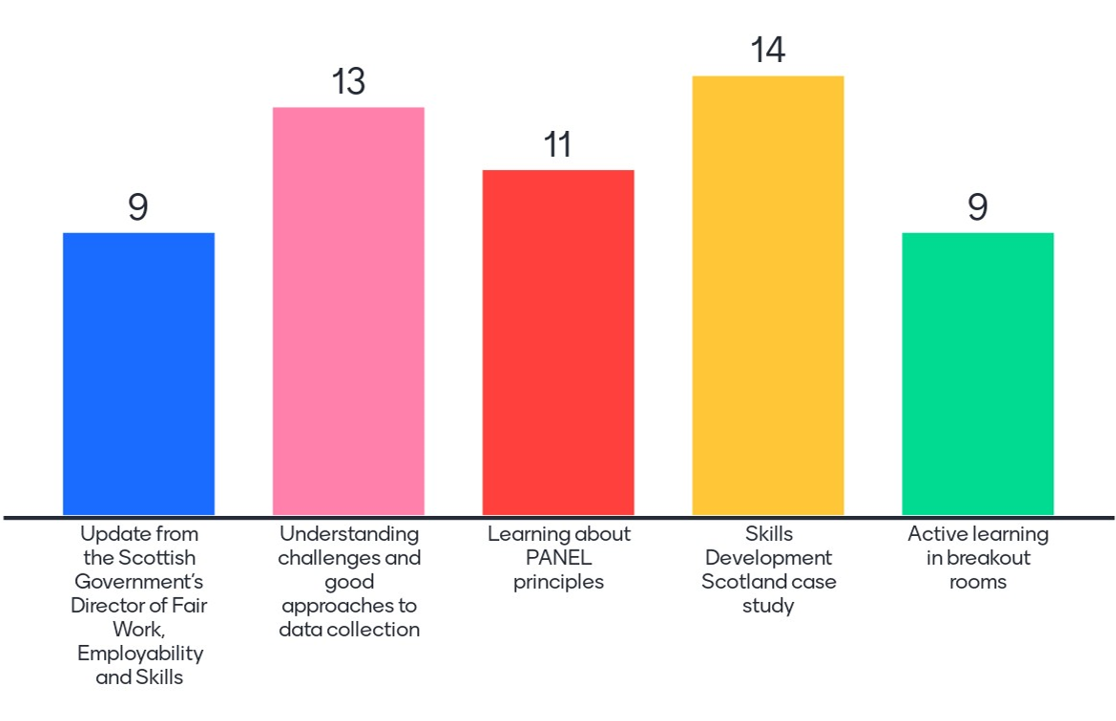
Conclusion and Next Steps
The purpose of this active learning workshop was to help organisations improve their ethnicity data gathering and understand how to integrate an equality and human rights-based approach in their work. It also served to inform the Scottish Government’s ethnicity pay gap strategy and ensure it supports organisations to improve their data practices. With the long-standing experience of CEMVO Scotland as an anti-racist organisation, we developed this opportunity in partnership with the Scottish Government to show how public services can increasingly embed equality and human rights in their strategic planning & day-to-day functions.
Listening to our Race for Human Rights clients and participant feedback from the Scottish Government’s National Conference on Race Equality in Employment held in in December 2021, we organised this active learning workshop for attendees to share and learn from practices across organisations and the wider public sector and to provide a safe space for organisations to speak openly and honestly about their journey to improve their ethnicity data.
We recognise that participant feedback is essential to empower voices and for attendees of the workshop to feel involved and valued. It also helps us learn, develop and improve our methodologies when we deliver services to public and third sector partners, such as the Scottish Government. The focus on a solution-based approach to this workshop has been received well as the majority of participants appreciated the sharing of good examples and the case study from SDS.
Following Chatham House rules, we successfully created a safe space through the breakout rooms where attendees were able to share their concerns and barriers, and exchange ideas and share practices where possible. This included the need for leadership and commitment from senior managers/personnel and peers. Issues such as access to a mechanism to provide their data, organisational trust and internal staff networks were also discussed.
Our participant evaluation has shown that there was a significant improvement in the understanding, application and importance of the human-rights based approach (PANEL principles) to build on organisational trust to improve ethnicity data collection.
We would like to thank everyone who attended and would like to reiterate that their feedback has been key to emphasising the issues across the public authorities, which will assist CEMVO Scotland to work with the Scottish Government’s Fair Work Unit to focus on further solution-based outcomes, to achieve racial equality in Scotland’s public sector employment.
We are keen to continue these workshops as a way to convene public sector leaders to share and learn practices, knowledge and overcoming challenges whilst on their journey to address racial inequality in their organisations.
Following publication of the Scottish Government’s ethnicity pay gap strategy in autumn this year, we will organise a further workshop, in collaboration with the Scottish Government, to support public sector leaders and organisations to apply the learning and take forward the actions outlined in the strategy, and to present case studies included in the strategy to help inform their approach.
